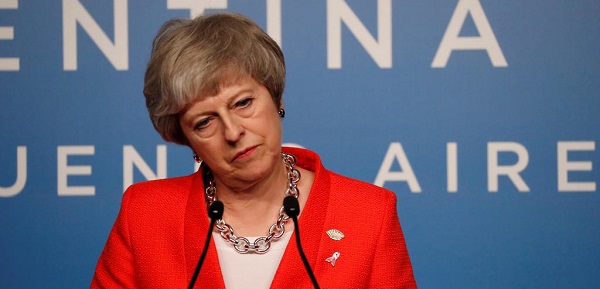May delays Brexit vote
December 12, 2018 | Expert Insights

British Prime Minister Theresa May announced that she would delay a vote on the withdrawal agreement she negotiated with the European Union.
PM May was expected to face a devastating loss in Parliament that would have threatened both her Brexit deal and her political survival.
Background
On June 23rd, 2016, Britain narrowly voted to leave the European Union, stunning Europe and the world in general. The EU employs a set of policies for its 28-member states that aim to ensure the free movement of people, goods and trade among other services. Britain is deeply intertwined with the workings of the EU especially with regard to trade.
Over the past year, leaders of member nations have expressed their dismay over Britain leaving the body. German Chancellor Angela Merkel and Dutch Prime Minister Mark Rutte are among those who have been vocal about their apprehension regarding the events that are unfolding.
In December 2017, UK Prime Minister Theresa May struck a last-minute deal with the EU regarding key issues. According to this deal, there will be no "hard border" in Ireland. The rights of EU citizens in the UK and the rights of UK citizens living elsewhere in the EU would also be protected in accordance with the deal.
The UK is officially set to leave the EU in March 2019.
Analysis
Nearly 100 members of her own Conservative Party had signalled they would vote against her half-in, half-out version of Brexit. Such a defeat would be hard for any prime minister to survive, but more so for May, who failed to win a majority for the Tories after a disastrous election campaign in 2017.
May instead chose the jaw-dropping humiliation of acknowledging the likely loss before it happened. In doing so, she extended her tenure long enough to give it another go with European negotiators. She insisted she had negotiated the best possible Brexit deal, but she agreed to return to Brussels this week and “do all that I can to secure the reassurances this House requires to get this deal over the line and deliver for the British people.”
By delaying the vote, May also prolonged the uncertainty over Brexit — whether, come March, there is her deal, no deal or no Brexit at all. On news of Brexit chaos, the pound sterling plummeted and the stock markets in the United States and Europe dipped.
May’s retreat did little to bolster her cause in Brussels, and it remains unclear what “reassurances” Europe can offer to placate her domestic critics.
E.U. leaders are exasperated by Britain’s endless domestic squabbling. Most view Brexit as a self-inflicted wound, worsened by lackluster leadership. And they wonder how long such a weakened prime minister can hang on to power.
Neither May nor the Europeans want a no-deal Brexit, although some hard-line Brexiteers say they are willing to suffer short-term pain for long-term independence. Economists have predicted that a no-deal “doomsday scenario” could result in food and medicine shortages; paralyzed trade and transport, including grounded aircraft; and a possible recession in Britain.
While May emphasized the need to deliver on the result of the 2016 Brexit referendum and to protect British jobs, lawmakers were upset that the vote was pulled.
Hard-line Brexiteers want a clean and complete break from the European Union, while Remainers say the proposed deal would incur economic costs to Britain without sufficient benefits. If May somehow manages to get better terms from the Europeans, she could return to Parliament later this month or in early January, at the latest.
The House of Commons suggested that the ultimate deadline for a meaningful vote in Parliament is March 28, the day before Britain is set to leave the E.U. May suggested that Jan. 21 was the deadline that applied.
Assessment
Our assessment is that based on the recent developments, a hard Brexit (or a Brexit without a secure trade deal) is looking more likely. We believe that there is no benefit to the UK or the EU if there is a hard Brexit. We also feel that calls for a second referendum will only get louder as PM May’s proposed Brexit plan is falling apart.








Comments